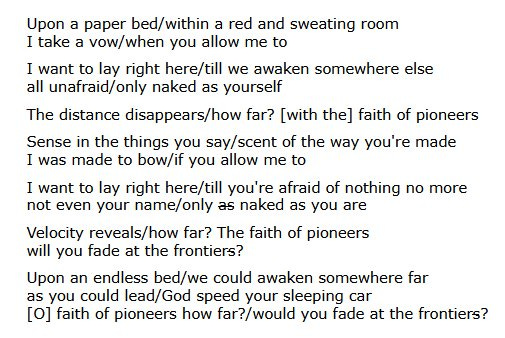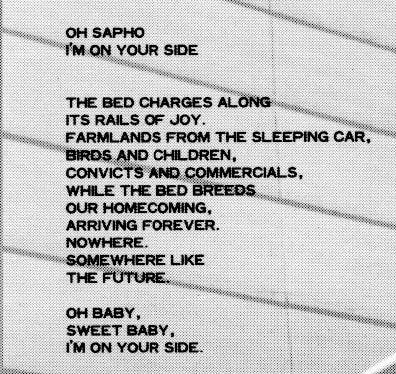I’ve updated this post to reflect very good ideas for Chris saying “Nevermore” from two musicians who know guitar challenges much better than I do.
When playing a live concert, musicians necessarily limit the number of songs played to fit time constraints. And when touring in support of a recent album, they understandably select songs from that album to fill several/most slots on their set lists, filling other slots with ‘hits,’ crowd favorites, or whatever they feel like playing at the time. Chris Whitley was no exception, but in only one case do we know that he affirmatively chose to never again play a particular song live: “Frontier” from Hotel Vast Horizon. And, based on the bootlegs and set lists we’ve compiled, it appears that he faithfully adhered to that decision.
Never Again!
Not playing particular songs often - or at all - was not unusual for Whitley. For example, some album tracks were, to the best of our knowledge, rarely or never played live:
Din of Ecstasy - “Guns & Dolls” played just twice (which I will never understand …)
Terra Incognita - “One Long Day” never played; “Alien” played just twice.
Hotel Vast Horizon - “Silhouette,” “Free Interval,” and “Wide Open Return” were never played; “Frontier” played once.
War Crime Blues - “Ghost Dance” and “God Left Town” never played.
What’s different with “Frontier” is that we have documented Chris’ “Never again!” based on Vast Combo bassist Heiko Schramm’s ATCW group comment1:
Chris came out at the studio with [“Frontier”], we jammed a lil over it and did it in a first track [take?]. So, then we played it once on the US Hotel Vast Horizon tour, at a SOUNDCHECK, no kidding, probably in Providence [actually, during soundcheck and live during the gig at Tin Angel in Philadelphia], which was the second or third show [of the HVH tour]. That was it. Chris won't play this song anymore.
Tin Angel was the second stop of the HVH tour, following an opening at the Village Underground in NYC, for which we have no set list. Thus, we have no way of knowing whether “Frontier” was played at the first stop of the HVH tour. However, a PopMatters review of the tour’s gig at Village Underground aptly describes the songs on HVH:
Whitley’s songwriting has taken a strange and beautiful turn for this record, becoming even more elliptical and slippery, every chord unexpected, but never jarring. The songs can seem monotonous, undifferentiated, but that’s because the experience of listening to them is like walking into a garden in the middle of the night: it all may be black at first, but if you stick around long enough for your eyes to adjust, there are flowers all around you. [emphasis added]
I admit that prior to latching onto the idea for this post, I found “Frontier” was not only “black at first”; it was nada, zilch, nothing. I couldn’t recall a lyric or a bar of music. But, as I’ve now listened several times, “flowers all around” have become visible. More on the enigmatic “flowers” I see in his lyrics later in this post.
Listen to Chris doodling a bit of “Frontier” at the Tin Angel soundcheck:
He clearly wasn’t happy with the “vocal level” but otherwise meh, okay.
Here’s the track from the Tin Angel bootleg:
I don’t hear substantial differences between the live track and the album track, but I have not just one but two tin ears. Please let me know if you do note differences.
So why did Whitley cry “Nevermore!”?
A Serving of Linguistics, Anyone?
I promise this will be a small serving ….
Perhaps Whitley soured on the song because the lyrics of “Frontier” are difficult to enunciate. Difficult in the sense that the syllables of the lyrics seem out of step - can easily go out of step - with the tempo/beat of the music. We expect certain syllables of words to be stressed; for example, e-NIG-ma, not e-nig-MA - stressing the second syllable, not the first or last. The same is true for words in a sentence: Why are YOU here? v. Why are you HERE? v. Why ARE you here? convey different meanings. An example of out-of-sync syllable and word stress is immediately evident in the opening lyric:
Sets my nerves on edge: “UP-on a PA-per bed… within a red… and sweatING room I ….” Just try reading the words aloud yourself: “Upon a paper bed/within a red and sweating room.” You likely spoke u-PON and SWEAT-ing and clearly enunciated BED. As Chris sings paper bed, he stresses both syllables of paper and stresses paper more than bed, so bed is squished, barely discernible. Anyway, my point is that syncing the lyrics with the music is difficult. Were I Chris, I too would have vowed “Nevermore!” because the likelihood of getting off on the wrong foot and stumbling through the lyrics is too great.
I wrote the segment above a week ago. During that time, I’ve heard Chris singing the first verse of “Frontier” in my head and hitting every syllable and word perfectly. So I listened to the album track again - meh, still seems off kilter.
[Update] Okay, But the Guitar Part Was a Bigger Challenge ….
Thanks to Keith Wood and AJ Deiboldt, I now realize that syncing the lyrics to the tempo of the music was only one challenge in performing “Frontier” live. As these guitarists noted in comments, Chris likely struggled with his guitar playing as well. Keith wrote,
[Chris] mentioned during the sound check that he has to tune way down on the National he’s playing, which has a short scale and was often difficult to dial in anyway. Maybe Frontier had some one-off tuning he came up with that proved to be problematic using live. I imagine that put him off trying to play it again on the tour and then he just drifted away from it since there were always other songs to play.
Good point! In fact, Hiroshi Suda - whose cover of “Frontier” generated the ATCW group discussion and yielded Heiko’s anecdote - wrote that anyone attempting to cover the song would “need heavy gauge strings or a Baritone guitar. Here I used D'Addario 11-49 Nickel Wound. Loose like rubber bands.” AJ reiterated that problem:
That tuning is in a bit of a musical no man's land as far as guitar is concerned. I always liked Frontier, but given how he did it in the studio, he'd have had to have a separate guitar tuned just for that song and I'm sure it wasn't worth it to him to do that.
At first, Hiroshi thought the tuning was B E B G# E B, but no, even lower! Listening to the bootleg and Chris’ tuning between “Blues for Andre” and “Frontier” revealed that the tuning is actually A D A C# E A. So, yes, just too much trouble to include in live set lists.
Lyrics - “Flowers all around”

Some music critics stated highly favorable views of “Frontier”, e.g.,
There is a hushed approach in the vocals and powerful economy of music in blues-based songs like “New Lost World” and “Frontier.” On the latter track, with lines like “I want to lay right here/till you're afraid of nothing no more/not even your name/only as naked as you are,” Whitley's lyrics are as starkly poetic as his music.2
Another review was even more laudatory: “The best song on the disc, the sexy ‘Frontier,’ is an intricate and funky tune.”
“Frontier” is surely “starkly poetic,””sexy,” and “intricate”; it is also, I think, one of Whitley’s most erotic songs. Here Whitley’s romanticism - discussed in an earlier post - blossoms beautifully, revealing flowers a casual listener might miss. He makes no mention of any aspect of sexual relations, yet the lyrics are charged with sexuality, describing lovers’ testing the boundaries of sexual exploration. How “naked” and “unafraid” can we be? “How far” can we/will we go? Can we be “pioneers”? Will we “fade at the frontier”? Let’s examine some of the metaphors Whitley used to convey a deeply erotic question without using any R-rated words.
Red = Passion, Sex
A word frequency analysis of Whitley’s lyrics counts “red” as the most used color, appearing nine times. Although the color red can symbolize many emotions and concepts - love, anger, danger, guilt, sacrifice, courage, Whitley typically used it as a metaphor for sexual passion, as illustrated in the following lyrics:
Velocity Girl: Twisted passages of passion plays/paradise is bleeding redCity of Women: I know these desires could kill me dead/how you gonna act instead/while everywhere I go/is wet and redGhost Dance: Them machines be grindin' neath my bed/ghost dancer defend my homestead/the medicine wheel the road is redBreath of Shadows: Fade to red/feed the twilight room/where she linger she rise/to shape these signs to you tonightThe “red and sweating room” is a scene of passion between two lovers - the narrator (“I”, “me”) and the listener (“you”). And that passion promises release and redemption but also can be dangerous and addictive.
Sex as a Religious Act
Whitley sometimes used religious words/concepts as metaphors for sex. Here, his “take a vow” calls to mind the following examples:
“Kick the Stones” - Take you for religion/Like the skin across my back
“I Forget You Every Day” - Waiting for to be confessed/on the floor all undressed
“Long Way Around” - Sister take your time to come to me slowly/Lead me down to the praying ground
“WPL” - Some religion’s sex all around
Pioneers and Frontiers
More sex? In this case, Whitley seems to be exploring the ‘boundaries’ of sexual adventures: “how far? … somewhere far as you could lead.” That lyric suggests his sexual partner leads the way in these pioneering adventures, but the later questions “Will (Would) you fade at the frontier?” indicate that she may not be as adventurous as she seems. After all, the narrator wants her to be “afraid of nothing no more.” Also, the narrator’s “if you allow me to” may serve as notice that he pushes sexual boundaries as well. So who is more pioneering and where is the frontier?
Sleeping Car
As soon as I read the words “sleeping car” in the lyrics, I thought “Odd, but he’s used that phrase before.” I have not been able to verify that Whitley wrote the poem below (from the Rocket House CD insert) …
… but, if he did, he was even more erudite than I inferred. He misspells “Sappho” but seems to refer to that revered poetess of Ancient Greece, specifically to Sappho’s hymn or ode to Aphrodite, the goddess of love and desire.3 As for the metaphor itself, “sleeping car” suggests travel/motion, confinement, privacy, motion while sleeping/dreaming. Paired with “bed” - “the bed charges along its rails of joy” and “the bed breeds our homecoming” - and applying those metaphors to the phrase “sleeping car” in “Frontier” again, Whitley seems to celebrate the joyful release and and journey of discovery that sex provides: “Upon an endless bed/we could awaken somewhere far/as you could lead/God speed your sleeping car.”
Speed = Distance/Time
These three concepts - speed, distance, and time - are frequent metaphors in Whitley’s lyrics. I’m working on another post, a deep-dive into Hotel Vast Horizon, which discusses these metaphors more fully. For now, just some hints of how these arise in “Frontier”:
Speed: “velocity reveals” - no clue what is revealed; “God speed your sleeping car” (did he mean “godspeed” as in have a pleasant, safe journey?)
Distance: “The distance disappears how far?/with the faith of pioneers” - pushing against boundaries?
Time: no specific references but allusions to stopping time (“I want to lay right here/till we awaken somewhere else” or “till you're afraid of nothing no more.” These lyrics call to mind what Whitley wrote in the credits of Dirt Floor: “On the dirt floor 'neath the facade of the future I undress my lover laughing naked where history has never existed”. Enthralled by passion, time doesn’t exist - no past, no future (it’s just a ‘facade’), only this moment of blissful surrender.
Perhaps, in addition to “Frontier” being a tricky song to sing and play, it was also a bit too intimate, prompting Whitley to decide “Never again!” Interpreting lyrics - what my former Lit Major self used to call “explication” - can lead to varied readings. Here, I’ve tried to “explicate” based on general themes evident across Whitley’s lyrics and on what he has said about how he writes his songs. You may find different meanings in his lyrics. If so, please share your interpretations in the comments.
Matthew Sonstroem, “Hotel Vast Horizon: Chris Whitley,” Hartford Courant, May 22, 2003.
Sappho, born on the island of Lesbos, is often associated with - in fact, her birthplace the root of - lesbianism. “Sapphic” is an adjective describing sexual attraction between women.








His guitar is really out of tune during Frontier in the bootleg recording. He mentioned during the sound check that he has to tune way down on the National he’s playing, which has a short scale and was often difficult to dial in anyway. Maybe Frontier had some one-off tuning he came up with that proved to be problematic using live. I imagine that put him off trying to play it again on the tour and then he just drifted away from it since there were always other songs to play.